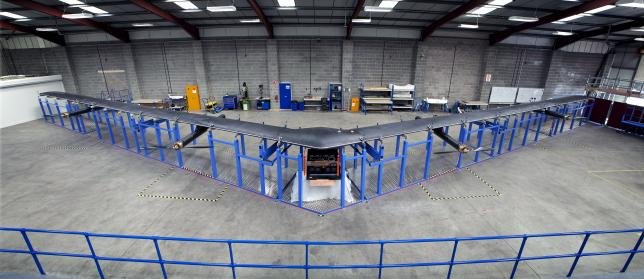Facebook has finished construction of its first full-scale drone designed to provide Intenet access to remote regions of the planet, part of a larger program called Aquila.
The drone will be tested in skies above the U.S. later this year, Reuters reported. Though weighing just 880 pounds, the vehicle has a 46-yard wingspan, and will need helium balloons to lift it up into the air. Once aloft, it will cruise around a two-mile radius at altitudes between 60,000 and 90,000 feet, avoiding both weather and commercial air traffic.
It will soar to the higher altitude during the day, descending to 60,000 feet at night to save energy. Facebook said the craft should be able to stay airborne for 90 days at a time.
On the subject of U.S. testing, an engineering director at Facebook, Yael Maguire, said that while the company doesn't currently face any regulatory obstacles, it's collaborating with policymakers on guidelines.
For Facebook, Aquila will offer the indirect benefit of creating more Internet users, in theory exposing them to its services and advertising. Similarly, another ongoing Facebook program — Internet.org — has been bringing free Internet access to people in countries like India and Pakistan, but not without controversy.
Initially the program limited access to a relative handful of sties and services, including Facebook's. This raised concerns about net neutrality, and protests led the company to open up third-party access, albeit with restrictions like no HTTPS support, and a block on VoIP services. Internet providers can also choose to reject services entirely.
 Roger Fingas
Roger Fingas




-xl-m.jpg)



 Chip Loder
Chip Loder
 Thomas Sibilly
Thomas Sibilly
 Wesley Hilliard
Wesley Hilliard
 Christine McKee
Christine McKee
 Amber Neely
Amber Neely
 William Gallagher
William Gallagher
 Malcolm Owen
Malcolm Owen









16 Comments
Why am I thinking, "For surveillance on us!" Is it the shape of the aircraft... or is it a new phase for Facemuck?
I believe it was Bill Gates that said Internet wasn't even in the top five list of things Africa needs. I think I will trust him over others whose business success is predicated on everyone accessing the Internet.
[quote name="Rogifan" url="/t/187441/facebook-completes-first-full-scale-drone-for-spreading-internet-access-to-remote-regions#post_2755086"]I believe it was Bill Gates that said Internet wasn't even in the top five list of things Africa needs. I think I will trust him over others whose business success is predicated on everyone accessing the Internet.[/quote] Seeing how we lived for eons without the Internet I don't think it's a 'need'.
Humans lived for thousands of years without, electricity, written language, cars, refrigeration, vaccines, gunpowder, corrective lenses, plastic, steel and lots of stuff that in today's world are things most people would agree, we 'need'. Needs change. Modern civilization cannot exist without the internet. That is why everyone was so concerned in Y2K, that trains would go off the rails.
That said, we definitely don't need Facebook.
If it's anything like FaceBook, it'll take off, the privacy policy will change, it'll spy on you and tell everyone you know what you are doing.